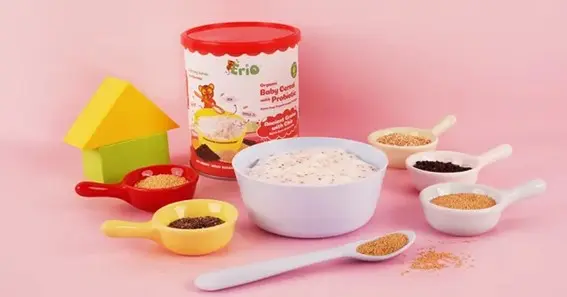The toddler stage is a crucial period of growth and development, and parents’ choices regarding their children’s diet can have a lasting impact on their health. This is where organic toddler snacks come into play. These snacks offer a delightful and nutritious way to ensure your child receives the best nourishment during this vital phase of life. In this article, you’ll embark on a journey to explore the world of toddler snacks, their benefits, and how they contribute to the wholesome nourishment of your growing child.
The Toddler Stage: A Time of Rapid Development
Toddlers are incredible little explorers, constantly on the move, discovering the world around them. This stage, typically from ages one to three, is marked by significant physical, cognitive, and emotional development. It’s a time when your child learns to walk, talk, and develop social and motor skills. Amidst all this rapid growth, their nutritional needs transform as well.
As toddlers become more active and engage with the world, their energy requirements increase. Proper nutrition is vital to support their physical and mental development. This is where snacks, especially toddler snacks, play a crucial role.
Also Read N: Building Lean Muscle: The Role of Diet, Exercise, and Supplements
The Appeal of Organic Toddler Snacks
Organic toddler snacks have gained popularity among parents for several compelling reasons:
- Pure Ingredients: Organic snacks are made from pure and unadulterated ingredients. These snacks typically do not contain synthetic pesticides, herbicides, or genetically modified organisms (GMOs). This ensures your child consumes food as close to its natural state as possible.
- No Harmful Additives: Organic snacks often avoid artificial colours, flavours, and preservatives. This means the snacks you provide your child are free from potentially harmful chemicals commonly found in conventional snacks.
- Nutrient Density: Organic farming practices prioritise soil health and biodiversity, producing more nutrient-dense produce. This translates into organic snacks with higher concentrations of essential vitamins, minerals, and antioxidants.
- Sustainability: Organic farming methods focus on sustainability and reducing the environmental impact of agriculture. By choosing organic snacks, you support environmentally friendly farming practices.
Also Read P: Elevate Your Outdoor Living in Traverse City: Deck and Patio Solutions by Handymen
The Role of Snacking in Toddler Nutrition
Snacking is an integral part of a toddler’s daily nutrition. Toddlers have small stomachs and high energy needs, so they require frequent meals and snacks to stabilise their energy levels. Healthy snacks fill the gaps between meals, providing essential nutrients and energy to sustain their active lifestyle.
However, not all snacks are created equal. The snacks you choose for your toddler can contribute positively or detract from their health. Here are some key considerations when selecting organic snacks:
1. Nutritional Value: Opt for snacks that offer nutritional value. Organic snacks often use whole grains, fruits, and vegetables rich in vitamins, minerals, and dietary fibre. These snacks provide essential nutrients your child needs for growth and development.
2. Texture Matters: Consider the texture of the snacks you offer. Toddlers are at a stage where they are learning to chew and swallow more substantial foods. Choose snacks that are safe and easy to manage to prevent choking hazards.
3. Flavour Variety: Toddlers are naturally curious about flavours. Use snack time as an opportunity to introduce a variety of tastes and textures. Organic snacks come in different flavour options, allowing your child to explore different tastes.
4. Portion Control: Proper portion sizes are crucial for toddlers. Snacks should complement regular meals, not replace them. Pay attention to the recommended serving size on the packaging and adjust it based on your child’s appetite and nutritional needs.
5. Allergen Awareness: Be vigilant about potential allergens, especially if your child has known allergies or sensitivities. Organic snacks often provide clear allergen information on the packaging.
6. Ingredient Transparency: Read the ingredient list carefully to ensure the snacks contain recognisable, organic ingredients. Avoid snacks that list artificial additives, excessive added sugar, or unhealthy fats.
7. Supervision: Always supervise your toddler during snack time. This ensures their safety and allows you to engage with them, model healthy eating habits, and respond to their cues and preferences.
Popular Choices in Organic Snacks
Toddler snacks come in various forms and flavours to cater to your child’s evolving needs and preferences. Some popular choices include:
- Organic Fruit Snacks: These often come as fruit bars, bites, or strips. They are a convenient way to introduce a variety of fruit flavours to your toddler.
- Organic Whole-Grain Snacks: Whole-grain snacks like crackers, rice cakes, and cereal puffs provide carbohydrates and fibre for sustained energy.
- Organic Veggie Snacks: Veggie-based snacks, such as sweet potato chips or broccoli bites, offer a fun way to incorporate vegetables into your toddler’s diet.
- Organic Yogurt Bites: These bite-sized treats provide the goodness of yoghurt in a convenient, mess-free form.
- Organic Nut Butter Sandwiches: Nut butter sandwiches made with whole-grain bread are a source of healthy fats and protein.
The Path to Wholesome Nourishment
Navigating the world of toddler snacks can be overwhelming, but you can make informed choices by prioritising organic snacks and considering your child’s age, nutritional needs, and preferences. Organic toddler snacks offer a delightful way to support your child’s healthy development and instil the importance of good eating habits from an early age.
In conclusion, toddlers are on a remarkable journey of growth and discovery, and selecting the right snacks is essential to support their overall well-being. Organic snacks, with their commitment to wholesome ingredients and minimal exposure to harmful chemicals, offer a nourishing option for your child’s snacking needs. Understanding the significance of snacking for toddlers and making thoughtful choices can provide your child with the best possible foundation for a lifetime of healthy eating habits.






